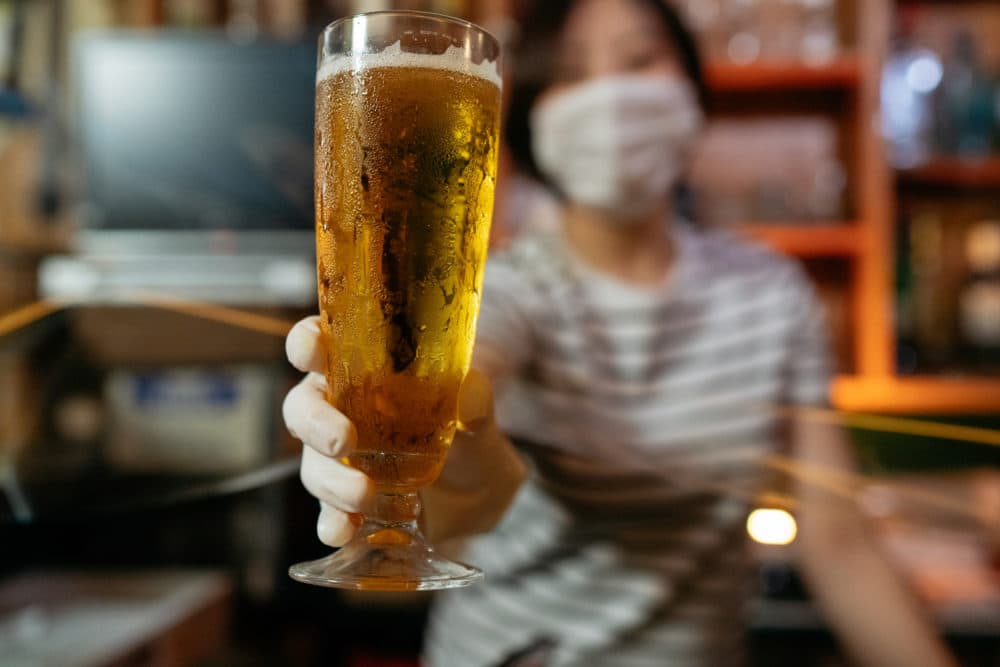Advertisement
Pandemic Stress, Boredom, Isolation Add Up To Sharp Rise In Drinking
Resume
An increasing number of studies show that one way of coping with pandemic-induced stress, boredom, stress or isolation is drinking.
A study from RAND Corporation showed Americans' alcohol consumption rose in every age group. And women report the heaviest increases, saying their episodes of heavy drinking — four or more drinks in a few hours — increased by 41%. Another study reports drinking doubled among parents with kids ages 5 to 7.
Vanessa Kennedy, director of clinical psychology at Driftwood Recovery in Texas, says she’s been seeing a “significant uptick” in stress-related drinking during the pandemic.
“Several patients that we've worked with have lost businesses, have lost the opportunity to connect socially with friends and extended family,” she says. “And social distancing has been emotionally very painful.”
Hospitals are also seeing an increase in admissions for liver cirrhosis and failure caused by alcoholism. There’s controversy around whether people should try to manage their drinking or abstain from alcohol altogether.
Experts like Kennedy use benchmarks to determine whether someone is developing a more serious form of alcoholism or drinking more during the pandemic to temporarily manage stress. People might not see an issue with having a few more drinks more during this overwhelming time, she says, but some of the warning signs include preoccupation, increased cravings or obsessive thoughts around drinking.
Women who entered treatment during the pandemic have described a conflict between the different roles they take on in their lives, she says. Many mothers now need to simultaneously work and provide child care.
Apps such as Cutback Coach and Moderation Management can help people create structure around drinking and provide tools to manage stress, she says.
“But they can also be a way to kind of check out — am I able to manage my drinking and get control over my habits? Or is my drinking really controlling me?” Kennedy says.
New York-based freelance writer and mother Erica Youngren wrote about her pandemic drinking in a Cognoscenti essay titled "The Pandemic Taught Me I Had a Drinking Problem."
Youngren came across Annie Grace’s book “This Naked Mind,” which is about controlling alcohol consumption rather than quitting altogether. She wanted to cut back on drinking but the book explains what alcohol does to one’s body.
“It became sort of harder for me to be at peace with the idea of continuing to drink, especially because of the other ways that it was making me feel,” she says.
While Youngren sees value in trying to drink in moderation, cutting back didn’t work for her. When she restricted drinking to the weekend, she found herself anticipating it.
“It almost became too much to manage,” she says. “For me, it was easier to just say, ‘I'm not going to drink right now. I'm not going to do that.’ ”
So Youngren quit drinking. Before she quit, she saw an occasional glass of wine turn into nightly drinking — and watched every “evening slid by in a haze of Sauvignon Blanc and streaming TV,” she writes.
During the height of the pandemic, parents needed to create a sense of escape from a difficult reality, she says. But upon looking into the sobriety movement and reading “This Naked Mind,” Youngren realized her method of self-care was carcinogenic.
In the essay, she writes about how her alcoholic father quit 40 years ago during her childhood. At that time, she says her father didn’t have the same modern resources on sobriety that focus on taking control of your life and feeling better.
Youngren writes about one interaction where she talked about her pandemic drinking with a fellow parent who said consuming alcohol isn’t compatible with raising small children. Some people found the interaction judgemental, but Youngren agrees with the parent’s response.
She couldn’t imagine her life without wine at that time, but now she acknowledges that drinking made her tired and impatient. And ironically, she’s the same age her father was when he stopped drinking.
“I really saw how things changed between him and me. And it made a big difference. He was so present,” she says. “And now I have a 10-year-old and I want to give that to her because I want her to be able to remember that I was very present.”
When Youngren decided to quit drinking in January, she wanted to control something during a time when the country’s outlook on the pandemic wasn’t quite as optimistic as it is now.
“I had the sense that if I stopped, good things would follow,” she says, “and I was right.”
Resources:
- Substance Abuse and Mental Health Services Administration national helpline
- Cutback Coach: Build healthier drinking habits
- Moderation Management
- Al-Anon Family Groups
- Alcohol Rehab Guide
Karyn Miller-Medzon produced and edited this interview for broadcast with Todd Mundt. Allison Hagan adapted it for the web.
This segment aired on April 28, 2021.

